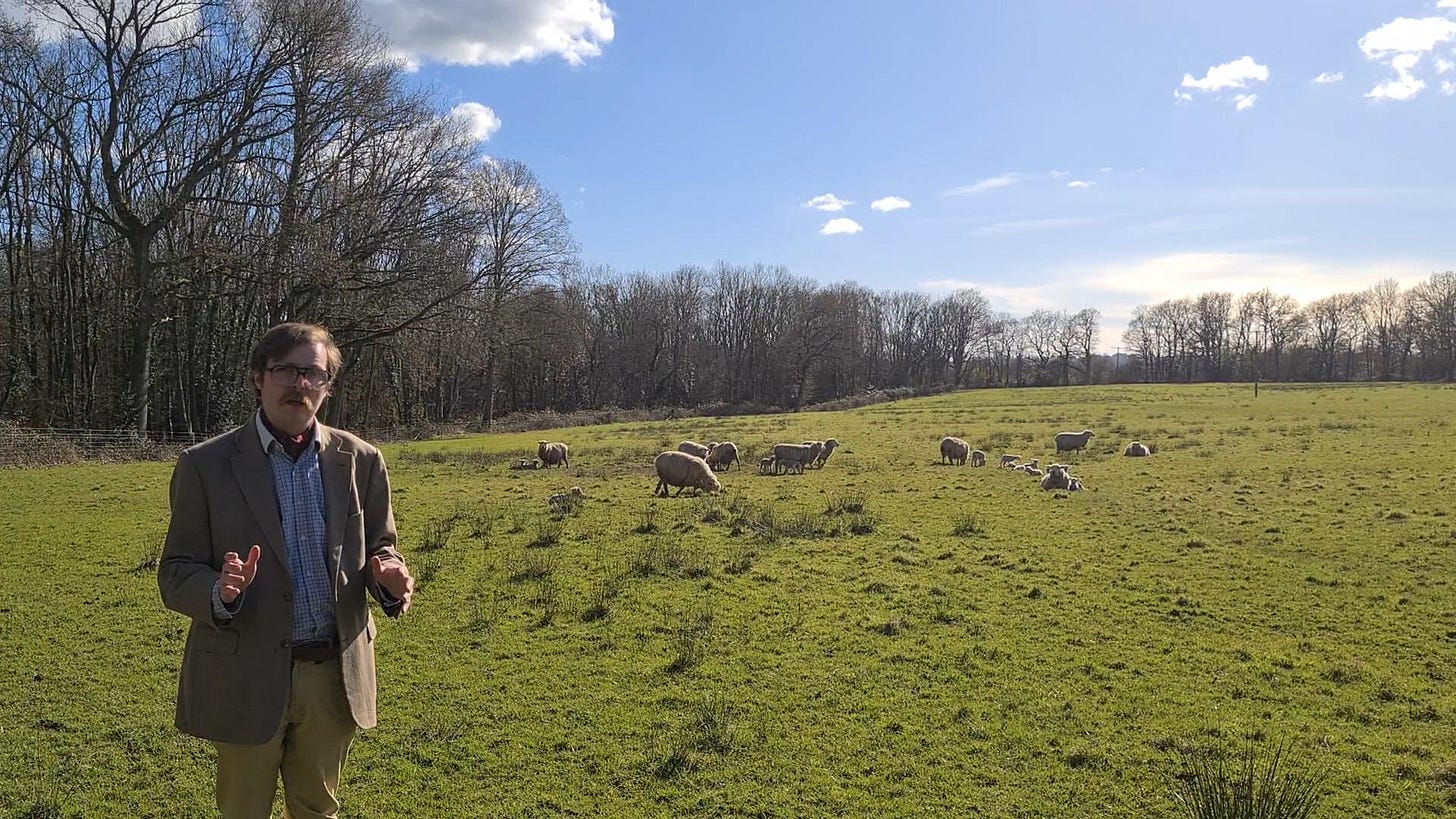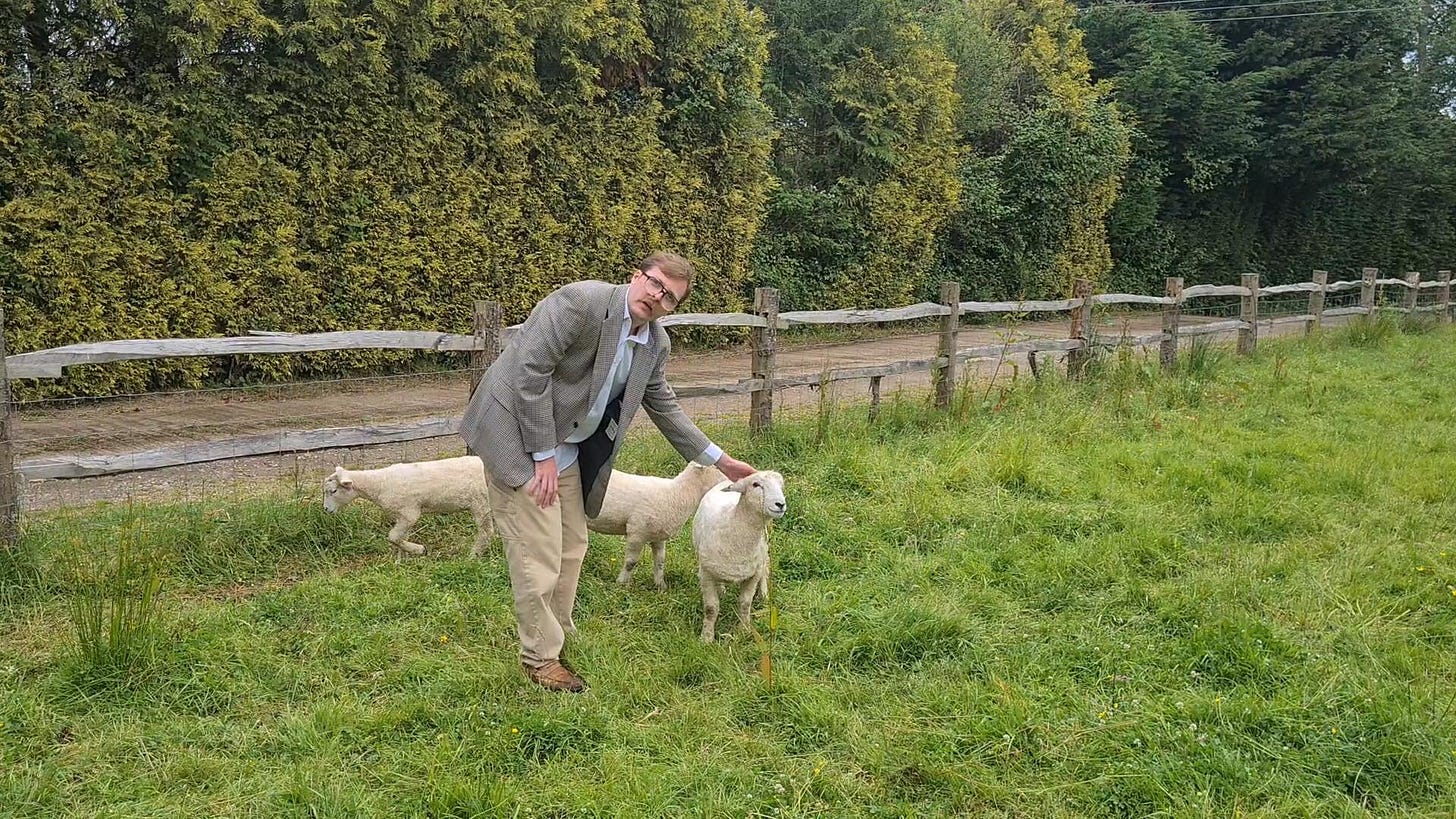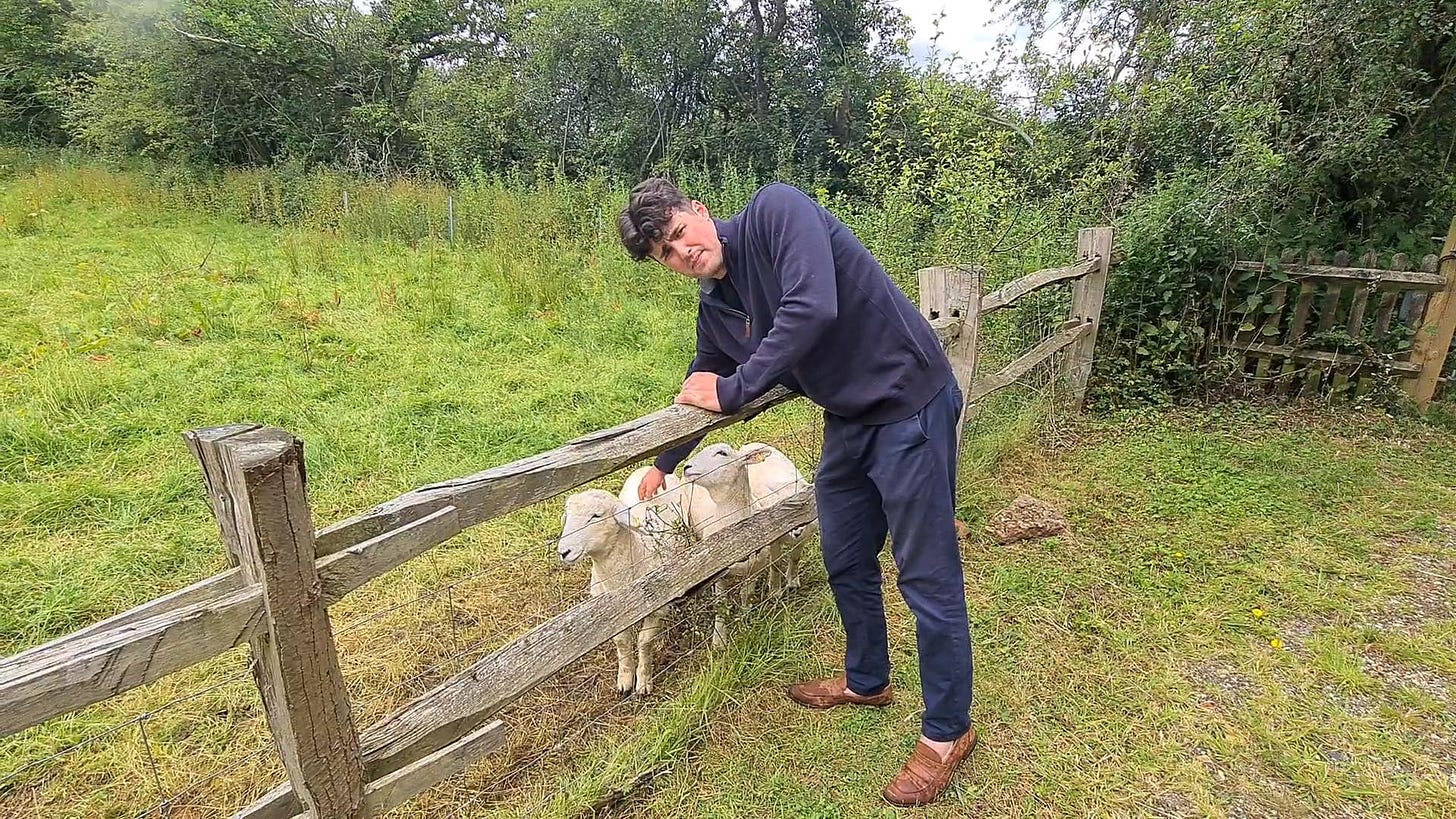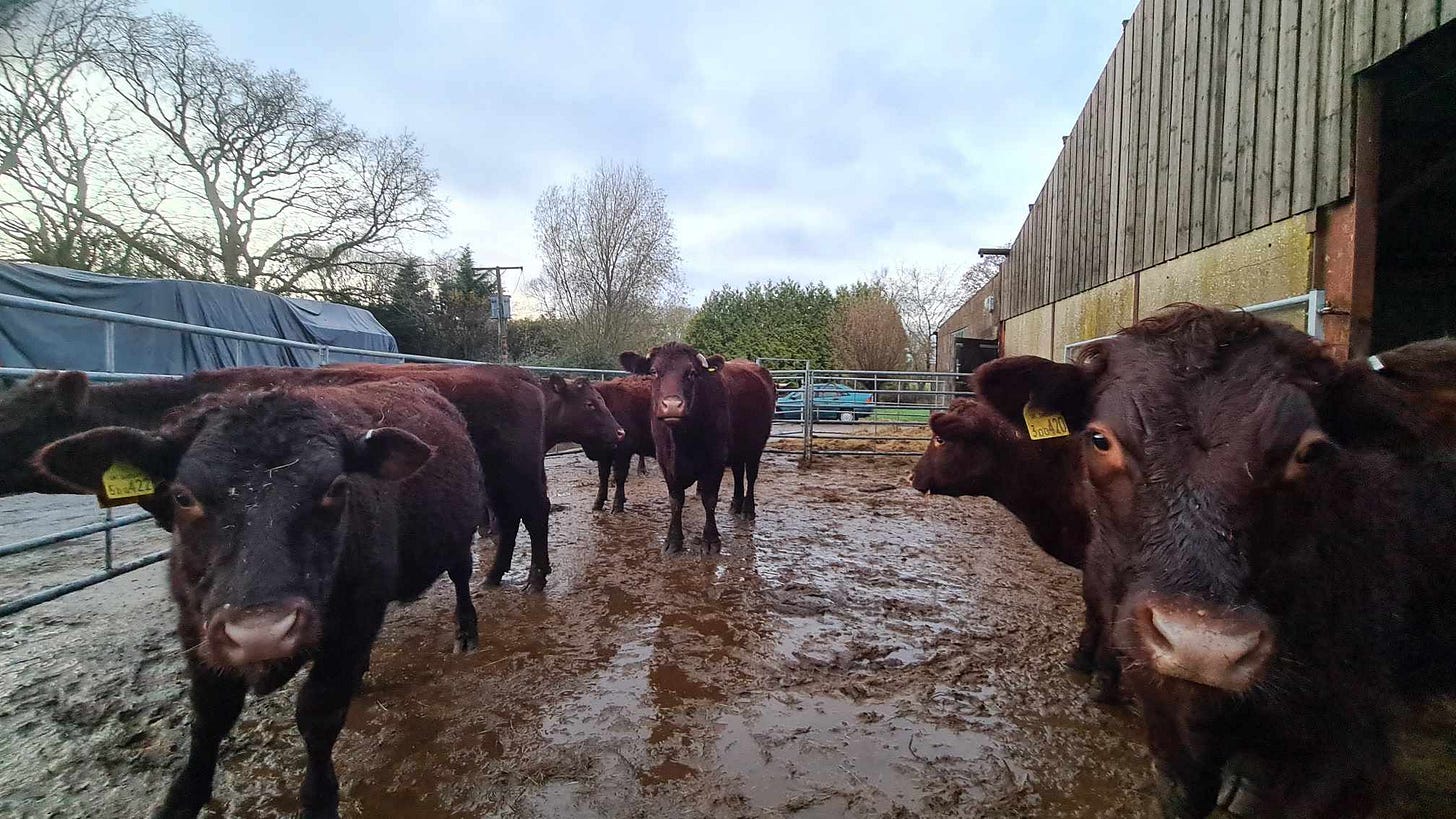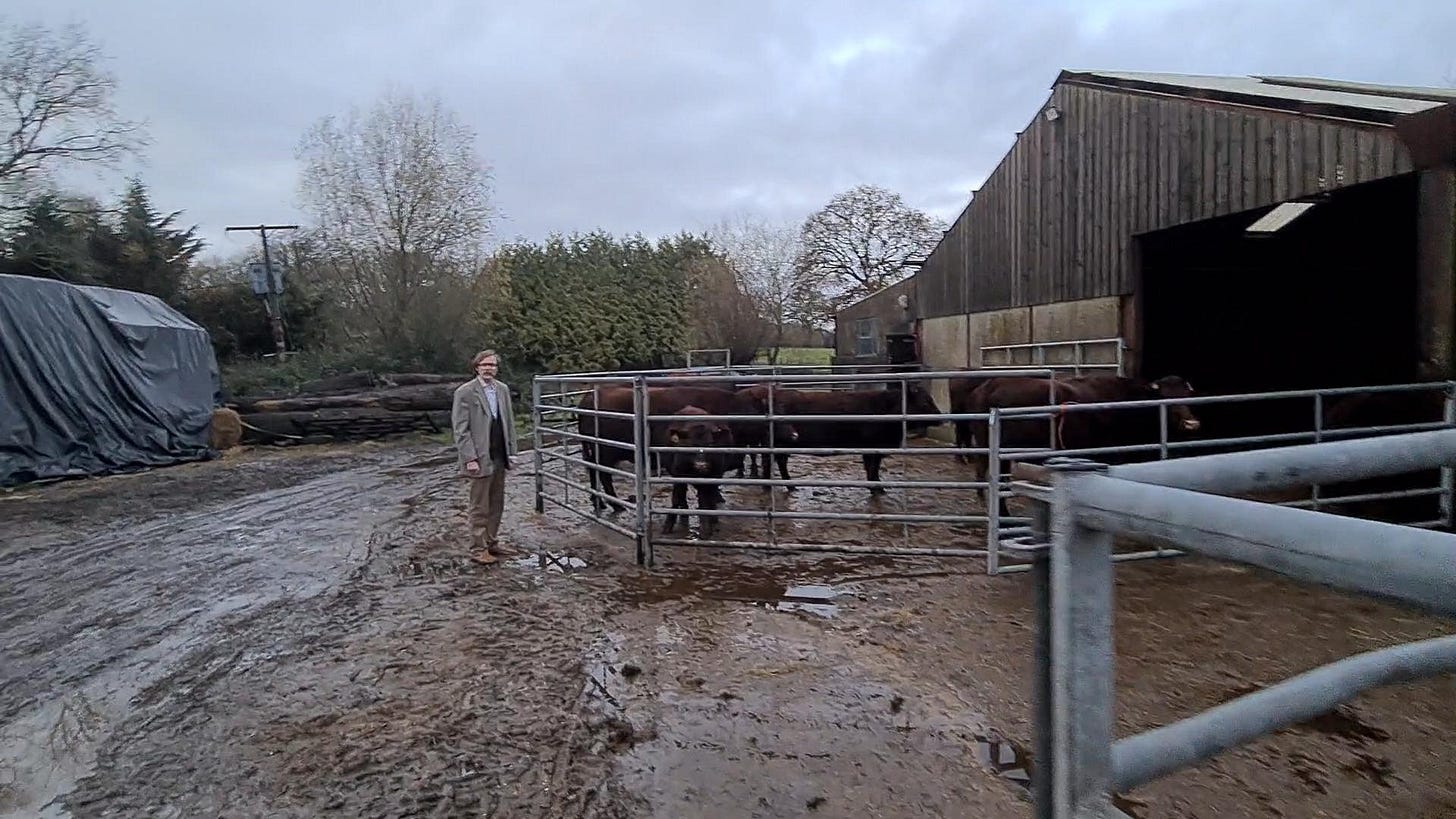Thoughts on Killing Animals
Defending Conscientious Carnivory
Introduction
In October 2023, I was suddenly overcome by a great sense that my habit of eating everyday meat was immoral. I remember waking up at night and that moral issue occupying my mind alone: For a while all other concerns of political philosophy paled in comparison. I gave up eating chicken within the month or the next and I have tried to live the life of a conscientious carnivore who only eats humanely raised meat ever since. Nevertheless, the discomfort has not entirely gone away: My stomach pulls me in one direction and different parts of my mind pull me in other ways still. Since I reject utilitarianism, I can find no comfort in believing a humane treatment of animals for the table is morally permissible because it is to their advantage; a position I naïvely spouted in the past. No. As a believer in rights for humans it is natural I would be intrigued by the rights case for animals too, which, very often, affirms animals have a right to life. I’ve thus been sucked into the complex moral question: Should I give up eating meat altogether to respect animal rights?
In these thoughts I argue it is morally permissible to kill animals for their meat provided those brought into existence by man live a decent life and are not subject to the infliction of net suffering relative to their natural condition. I make two types of arguments for this conclusion: Human interaction arguments and intrinsic arguments. Human interaction arguments point to the implausibility of humans having to significantly alter their behaviour in the face of an animal’s right to life. I first raise the implausible requirement of humans having to give up a lot of everyday activities such as farming particular vegetables and giving up cats as pets; second, I raise the dilemma for vegans of having to either accept self defence against animals is wrong, or, grant killing of a lot more animals into morality than they’d typically like. My intrinsic arguments point to the implausibility of Tom Regan’s subject-of-a-life idea, and, I contend, drawing on Roger Scruton, the inability of animals to pursue the higher goods, e.g. intellectual endeavour and creativity, and, self-consciously engage in long term projects bars them from a right to life. I finish by explaining how the acceptance of the moral enslavement of animals by vegetarians undermines their argument for an animal’s right to life too.
I should be very clear that these arguments do not justify the factory farming of animals at all: I would encourage all my readers to give up chicken entirely and only eat humanely reared pork, beef and lamb otherwise. Despite 74% of people believing free range is most common on British farms the truth is very different. 94% of British broiler chickens are reared intensively in terrible conditions of ammonia and their own faeces which we would all immediately condemn if we didn’t know we’d have to pay a higher price for humane meat, and, 93% of British pigs are raised indoors in packed and very often painful conditions. I will address exactly how to be a conscientious carnivore in the final part of my thoughts on animals but the best advice I can give now to carnivorous readers is: Don’t eat chicken, eat lamb instead. As pictured below, lambs are brought up nicely.
Part 1: Human Interaction Arguments
Cats & Arable Agriculture
It is morally permissible to keep a cat even though cats in the UK kill 275 million prey such as mice and birds each year. If animals had a right to life then keeping a cat would be morally impermissible because such a right to life would be violated by our pet ownership. Thus: We have reason to believe animals do not have a right to life. Put another way – If vegans really believed animals have a right to life which cannot be overridden by the minor pleasure derived from eating them, by parity of reasoning, vegans would have to accept having cats as pets is impermissible too, because, the minor pleasure of keeping them cannot override the right to life of the cat’s prey either. This need not commit them to the implausible conclusion the factory farming and slaughtering of almost 1.11 billion broiler chickens in the UK is morally permissible though. This is because they could accept the below.
It is impermissible to deliberately inflict net suffering upon animals, however, foreseeing the suffering of animals as a result of your action is permissible. This principle adequately captures the intuitions of most people. This is because it does not permit factory farming of animals which is deliberately inflicting suffering upon animals, e.g., by putting chickens into cages and clipping the teeth of pigs, but it does permit the killing of trillions of insects which likely do feel pain as a result of driving and housing construction. Moreover, I believe this captures the common belief it is wrong to inflict pain on animals for the pleasure of it. (Incidentally this resolves the animal dispute between Bryan Caplan and Micheal Huemer too).
I suspect vegans may argue the 275 million prey would have died anyway, hence, the cats killing them is no issue at all, so, they can maintain animals have a full bodied right to life. Vegans who are quick to say animals should have the same rights as humans cannot embrace this moral position, after all, we still claim killing a human is impermissible even if not doing so would still result in them dying of an incurable disease. Should vegans still hold the 275m killings are morally permissible, then, the animal right to life is very clearly distinct from the human right to life. Certainly, deontological vegans affirming their right to keep pets in this way must accept the hunting of wild animals such as deer, ducks and pheasants which would otherwise die soon of old age, starvation or natural predation as I have shown in the last article.
If vegans maintain it is wrong only to kill animals which would otherwise have survived, as, surely many birds and mice would have, then they still cannot keep cats as pets. Since I doubt they would be willing to give up their cats, and, crucially, would assert they are not acting wrongly by keeping their cats, I would argue they must concede it is not wrong to kill animals which would otherwise have survived. Hence, it is permissible to kill animals for meat which would otherwise have survived too.
At this point I think a few vegans may simply bite the bullet and agree their commitment to animal rights requires them to give up their cats. I would maintain though the same argument in a different form will force vegans to either condemn their own diet or concede killing animals is not inherently wrong. I believe it must be admitted by vegans arable agriculture alters the food chain. For example, by increasing their consumption of blackberries at the expense of wheat for bread they may change the food chain from one where few mice are eaten by owls to one where many mice are eaten by owls. Whether or not this example is accurate is largely irrelevant: The principle is what counts. By changing their consumption at the margin from vegetable A to vegetable B they can increase the number of animals which end up being killed by predators, which, I imagine, is very painful.
If the pleasure of eating meat does not warrant killing animals, analogously, the pleasure of eating blackberries does not warrant the killing of animals either. Hence, the vegan must restrict their diet to those food stuffs which minimise the death of animals. Or, at least, the range of food stuffs they can eat must be greatly restricted. Perhaps there is a ratio of gastronomic pleasure to animals killed which ensures vegans can eat a diet which does not minimise the killing of animals. I think most vegans would not accept they are morally required to restrict their diet even further; hence, they should accept animals don’t have a right to life and it is permissible to kill them to eat them. I believe this is the same reasoning Piers Morgan invoked in debating a vegan on Talk TV. (Although he used the example of bees instead of mice).
I think a promising strategy for the vegan is to argue it is wrong to kill animals for the sake of eating them, meaning, the unintended killings of animals ensured by their vegan diet is entirely permissible because these deaths are not intended. This draws on the doctrine of the double effect, i.e., the moral idea there is a distinction between foreseeing killing and intending killing. I would note here this doctrine allows for the possibility of greater animal suffering than a humane scheme of farming, for example, if the population of mice increased due to raising more fruit and vegetables, instead of grass for livestock, which were then eaten by owls, eagles and snakes. Unlikely, but possible. Essentially, animals have the right against being deliberately killed.
I would question the existence of this right though. Many readers, including vegans, will have had dogs which they have put down when they have deemed their suffering as too great. I think this is entirely permissible, indeed, I think doing so is good. To admit this though is to concede animals do not have a right against being deliberately killed, hence, the vegan cannot oppose the slaughter of livestock on this basis alone. Instead, they must invoke a right against being killed when such killing is against the animal’s interests. At this point the vegan must determine the baseline for the interests of animals. Perhaps the baseline for interests is the natural condition of the animal. Shooting an aged or ill pheasant soon to be torn to death by a fox would be permissible under this baseline because being cleanly shot is preferable to being torn to death by a fox.
When it comes to farm animals many will say the baseline should be nonexistence because they wouldn’t exist were it not for humans eating them, meaning, any humane raising and killing of animals is permissible since it advances their interests. This argument for raising animals for slaughter does not apply to raising humans for slaughter, so, no reductio ad absurdum exists here. This is because we can imagine humans who genuinely have no prospect of any net good being realised in the rest of their lives but who we would still object to killing, unlike, say, the mentioned dog which needs to be put out of its misery. Whatever exists within these miserable humans which prohibits killing them, but doesn’t exist in the dogs who needs to be put out of his misery, has the potential for being the sole ground for a right to life, thus, excluding animals and warranting their slaughter. Robert Nozick would raise this reply to the general argument of this section:
‘Suppose I enjoy swinging a baseball bat. It happens that in front of the only place to swing it stands a cow. Swinging the bat unfortunately would involve smashing the cow’s head. But I wouldn’t enjoy doing that; the pleasure comes from exercising the muscles, swinging well, and so on.’
Nozick argues this is wrong, hence, whether animals are used as mere means or simply ridden roughshod over is not a distinction which makes any difference to the permissibility of swinging. Analogously, Nozick could argue mice being torn apart by you intentionally, or, by your unintended actions, via an owl, makes no difference either. Then Nozick could say since it is not permissible to incidentally kill animals that this cannot be used to support deliberately killing animals. Personally, I wouldn’t swing the bat. Yet I would keep a cat. I don’t know what to say here.
The Self Defence Dilemma: To Hunt or be Hunted
Another argument which shows the implausibility of the vegan case is this. Many philosophers such as Micheal Otsuka take a forfeiture approach to self-defence, i.e., they contend an individual attacking another person gives up their right not to be attacked due to their immoral action. Where this moral reasoning is applied to animals, and, it must be said, vegans are quick to argue animals should be treated like humans, then, a bear, wolf or tiger attacking someone could not be lethally resisted, because, they don’t have the moral capacity for immoral action hence they cannot forfeit their rights which allows for your self-defence. The vegan would have to watch herself be eaten by these beasts. Should the vegan go so far as to extend rights to insects too then they’d have to accept millions of people in Africa being unable to defend themselves against mosquitos carrying deadly malaria. All of this makes the vegan case very implausible. At this point I suspect the vegan will reject the forfeiture approach to self-defence and perhaps embrace Nozick’s, Judith Jarvis Thomson’s and Eric Mack’s view that a counter attack is warranted when anyone is threatening to kill you. So, though the bear remains an innocent threat it loses its right not to be killed by attacking the human.
This puts the vegan into a dilemma, because, animals attacking other animals or humans now lose their right not to be killed. Now should deer exist in a wood they will threaten many animals such as mice, baby squirrels and birds, meaning, the mice, baby squirrels and birds have the right to counter attack in a lethal manner. Obviously, such animals cannot do that, however humans can act on behalf of the mentioned animals and kill the deer. Sure, the deer hunter in such instances wouldn’t be conducting self-defence for the purpose of saving them, instead it will be done for profit, but this is irrelevant; mercenaries fighting just wars are still entitled to fight even though their main purpose is profit too. This is the truth to be found in Benjamin Franklin’s defence of meat eating insofar as it justifies a hunting of omnivores in a few instances. Should insects be included in the beings with rights not to be killed then ducks, geese and pigeons would all be open to being hunted too (and, maybe, free range farm animals too). And as Amos Wollen notes here they do appear to suffer from pain which should al la David DeGrazia’s reasoning include them in the circle of rights. To prohibit human enforcement of animal rights would be to privilege some species (e.g., owls eating mice) at the expense of others (e.g., mice) which would breach DeGrazia’s idea we should keep ‘a presumption of equal consideration’ in our morality too.
Part 2: Intrinsic Arguments
The above arguments have not got to the meat of the issue. Conscientious carnivores need to explain what is present in humans which grants them a right to life which is absent in the case of animals. In this section I draw on Roger Scruton, Tibor Machan and Nick Zangwill to try to explain what is absent in animals which bars them from having a right to life. I should add these thoughts are very much reflections, musings, ponderings, or, ruminations. Before I delve into those thoughts, however, I will point to an implausibility in Tom Regan’s argument for animal rights.
Regan’s subject-of-a-life explanation
Regan roughly argues humans and animals have a right to life on the basis: ‘[W]e are each of us the experiencing subject of a life, a conscious creature having an individual welfare that has an importance to us’. This casts the net of the right to life too widely. Should the presence of individual welfare within an entity be taken as the moral basis for the right to life, plants, as well as humans and animals, would have it too. This is implausible since justice would then require the extinction of all human and animal life, or, an awkward threshold to the demandingness of the right would have to be established permitting the eating of plants. Against this, Regan could argue ‘the experiencing’ of ‘a conscious creature’ crucially constitutes the very idea of individual welfare, hence, plants not having consciousness of their condition do not have an individual welfare, thus, they have no right to life, stopping the reductio ad absurdum.
This is implausible as we need not be conscious of many aspects of our lives for us to have an interest in them; and these interests still make up our individual welfare. For example, I have an interest in my wife being faithful to me, and, should she cheat, even if I never find out about it, my interest in her faithfulness is set back: My life is worse. Granting instances such as this means plants could have interests of a similar nature making up their individual welfare. And this would seem to grant the right to life to plants, hence, we are led to the implausible conclusion all human and animal life must extinguish itself. Regan gestures to this argument of mine when he states ‘whether [inherent value] belongs to others – to rocks and rivers, trees and glaciers – we do not know’. He goes on to say ‘but neither do we need to know, if we are to make the case for animal rights’. I suppose that is strictly true. However, should we discover that plants have ‘inherent value’ then we are a led to the implausible conclusion I have mentioned; which makes Regan’s basis for animal rights implausible as well.
The Moral Status of Animals
I now want to muse on the moral foundations for bestowing a right to life upon humans but not on animals via an exploration of Roger Scruton’s thoughts on it. To begin with animals ‘lack imagination’ ‘do not engage with…long-term planning’, and, ‘do not make choices’. Instead, the world of animals is confined to what is remembered with projects occurring over short periods of time with acting governed by the basic urges. Many of the goods of life are denied to animals as a result. A crucial distinction between human and animals for Scruton is self-consciousness; Humans are ‘aware of themselves and their own states of mind’ and ‘this does not seem to be shared with the lower animals’.
Nick Zangwill notes animals do not have the ability to reflect on their desires; considering whether they are good or bad is beyond them. He writes: ‘We can ask: ‘Why did the chicken cross the road?’ but the chicken cannot ask itself: ‘Why should I cross the road?’’’ Among other features, such as language, the right to life is bestowed in virtue of these psychological features according to Scruton. Certainly, the absence of complex thought stops animals from forming an explicit wish to not be killed. I believe it is these psychological features which enable mankind to access the objective goods of intellectual endeavour, beauty and creativity which animals are not capable of, or, at least, minimally capable of accessing. Obviously, this commits the conscientious carnivore to the objective list theory of the good; which also happens to be most popular among professional philosophers.
Scruton also makes another important point: ‘[H]uman beings… are self-created beings. They realise themselves, through freely chosen projects and through an understanding of what they are and ought to be’. This connects to Nozick’s experience machine. One of the reasons we should not step into it according to Nozick is because ‘we want to do certain things’: This is said to give great value to life. Animals are not as capable of reflectively choosing as humans; they occupy less intense experience machines embedded in their very psychology, as a result they moderately miss out on this great value, meaning, their lives are of less value as a result. This further undermines the plausibility of them having a right to life. I don’t think this is fanciful.
When I look out at the sheep forever eating grass in the fields, I do honestly think mankind gets something distinct out of the world from them: I imagine much of their mental life is rather like staring in a daze at a point of view video of a sheep eating grass and I don’t think that bestows a right to life on a being. If I had to summarise my thoughts from Scruton in a phrase it would be this: Animals do not have a right to life because they are incapable of self -consciously accessing the higher goods of life, e.g., creativity and intellectual endeavour, and, they do not pursue long term projects.
As Loren Lomasky has observed, the typical reply on the part of the vegan is to look to marginal humans such as the comatose or severely mentally retarded, note they have the same psychological features as animals, claim this warrants killing these humans, contend this is unacceptable, and, hence, conclude killing animals is unacceptable too. I think carnivores who embrace the above reasoning must accept they have to bite this bullet and allow for the killing of these beings. It is just speciesism otherwise: Entirely ad hoc. However, I should note, this doesn’t permit them to be terribly tortured, instead, such beings are entitled to not be subject to the net imposition of suffering upon them relative to their natural condition. A number of my discussants have pushed back against this conclusion and asserted that humanity itself bestows rights upon every human.
This is very implausible as it implies in our evolution there was an addition to our DNA, 98.8% of which we share with chimpanzees, which suddenly granted us full individual rights. Why should different chunks of adenine, thymine, guanine or cytosine, i.e., the building blocks of DNA, have any moral significance per se though. Additionally, should we discover rational aliens we’d have to ask whether they warrant individual rights as we have them, when, obviously, rational aliens would have such individual rights, meaning, the most plausible explanation for the moral basis of our rights is the rational nature we would share with these aliens not our genome. At this point a few people simply say God grants all humans a right to life and that is the end of it.
It is implausible to think consciousness of pleasure and pain alone bestows on a being the right to life too. If a creature could only experience the warm sensation of heat and the painful sensation of cold, I doubt this would be enough to bestow upon it the right to life. Should it be quickly slayed it has lost nothing of which it is aware. Against this animal rights ethicist David McGrazia has argued that ‘death is an instrumental harm insofar as it forecloses the valuable opportunities that continued life would afford’. At this point, I could imagine McGrazia arguing a right to life is constituted by it being wrong to reduce the stock of pleasure over pain relative to the natural condition of the animal. Indeed, after reading his short book, Animal Rights: A Very Short Introduction, admittedly concerning a discussion of our obligations to pets, I found he states: ‘the animal must be provided with a life which is at least as good as she would likely have in the wild’.
It is very implausible to think you cannot setback pleasure over pain for animals relative to the natural condition of them too, since we do that all the time as humans, indeed, agriculture of any sort would have to be ruled out which would condemn billions of people to death. So, why can’t we kill them for meat setting back their interests relative to their natural condition. It would be implausible to contend the emergence of moral agency in humans suddenly meant humans were not able to set back the interests of any other species. Indeed, this would just privilege animals insofar as they could setback ours, but we not theirs! In contrast not deliberately inflicting suffering does seem plausible.
I believe the moral importance of the psychological factors I have mentioned enables the vegan thinker to avoid the problem of putting animal life on an equal footing to human life also. Should animal life and human life be on an equal footing then morality would require, for example, not shooting two bears tearing apart a woman because the two bears would have a greater right to life together. Huemer admits should you be faced with a choice of hitting a human or ten pigs (imagine the breaks in your car have failed) you should ‘hit the pigs’. According to him it is because of our capacity to embody moral virtue, conceive of great truths, and, come to grand achievements that ‘typical human lives are more valuable than typical animal lives’. I would contend the moral reasons Huemer and other vegans invoke for the lesser importance of animals compared to humans gives some justification to the case for animals not having a right to life.
The Enslavement of Animals
A fundamental feature of morality concerning humans is we cannot be taken as slaves, yet, vegetarians such as Huemer permit the slavery of animals, meaning, Huemer must believe there exists an important enough distinction between humans and animals to warrant slavery of the latter but not the former. I contend this important distinction grants increased plausibility to animals not having a right to life too. Slavery is roughly defined as the state of being partially or fully possessed by another, or, realisably threatened with that, and, being forced to labour or give up the fruits of your labour to them. Pets are enslaved today and Huemer would permit egg collecting and dairy farming of a humane character as well. The Kantian imperative to not treat individuals as mere means but instead as ends in themselves is violated by enslavement. Since Huemer permits the slavery of animals the Kantian imperative cannot apply to animals, meaning, the Kantian imperative not to kill them goes with it as well. I suspect similar reasoning applies to other arguments which establish both the right to not be enslaved and killed on the same foundation.
It could be argued against my moral reasoning that pets, cows and chickens’ consent in a way to such treatment, and, therefore, no slavery exists. I am sympathetic to this. Cows walk into barns to be milked, chickens don’t care about their eggs, and, pets don’t mind being kept inside. Maybe an action is consented to in a way should it be in the interest of the animal (note though we are not really discussing consent here) Permitting the collection of fertilised eggs, however, does set back the interests of hens. Equally, dogs are punished at times against their interests relative to no punishment. The enslavement point cannot be avoided by a broader interpretation of consent. Stopping the reproduction of a being is major setback to its interests. Our dead dog, Wooster, once went to see my ducklings in the Wendy house and Poppy, their mum, went ballistic and attacked him, such was her urge to defend her young. If humans can set back this very large interest, why, analogously, cannot humans set back their very large interest of continued living too.
A Note of Concern
The morality I have outlined has a strange structure, i.e., I accept it is wrong to inflict net pain on animals as mere means to our ends and to bring them into existence where they don’t have decent lives, yet, besides these two prohibitions on their treatment, animals can be used as mere means to our ends, e.g., to turn into steak, fur hats or the handle of one of my razors. Plus, I think it is fine to ride roughshod over them in pursuing our lives, e.g., building houses, driving and eating vegan food, all of which creates a lot of animal suffering. I cannot say much more than this: These thoughts fit our intuitions quite well and there is a degree of coherence to them as they are united in not inflicting net suffering on animals. It is the fact there exists only ‘a degree of coherence’ that still troubles me though.
Conclusion
Animal rights is a tricky area of moral philosophy for many people, including myself, to honestly engage in, because, the stomach is always pulling in one direction perhaps against the subtle voice of morality in the other direction. Nevertheless, I have honestly attempted here to make a solid case for conscientious carnivory rooted in plausible moral theory. Should humans think it is acceptable to keep cats and engage in arable agriculture they must accept killing animals is morally permissible for the small gains made at the margin of those endeavours. A moral license to kill attacking bears, i.e., innocent threats, also opens up many animals to being killed in order to defend other animals too. At the fundamental level, however, animals lack the ability to self-consciously pursue long term projects and to access the higher goods of life, for example, creativity and intellectual endeavour, which probably bestows a right to life upon a being. For these reasons, I believe it is morally acceptable to eat humanely reared meat.


